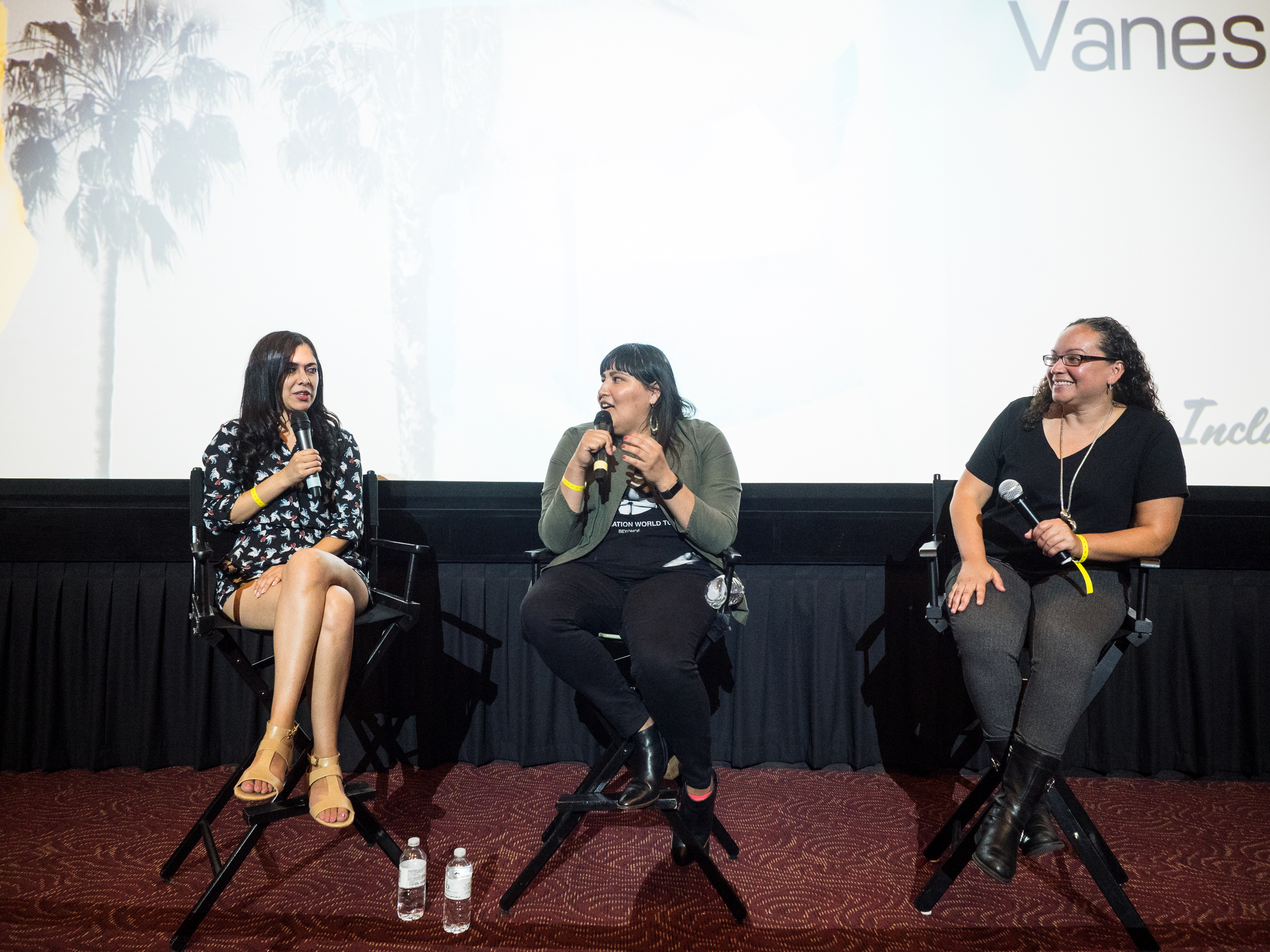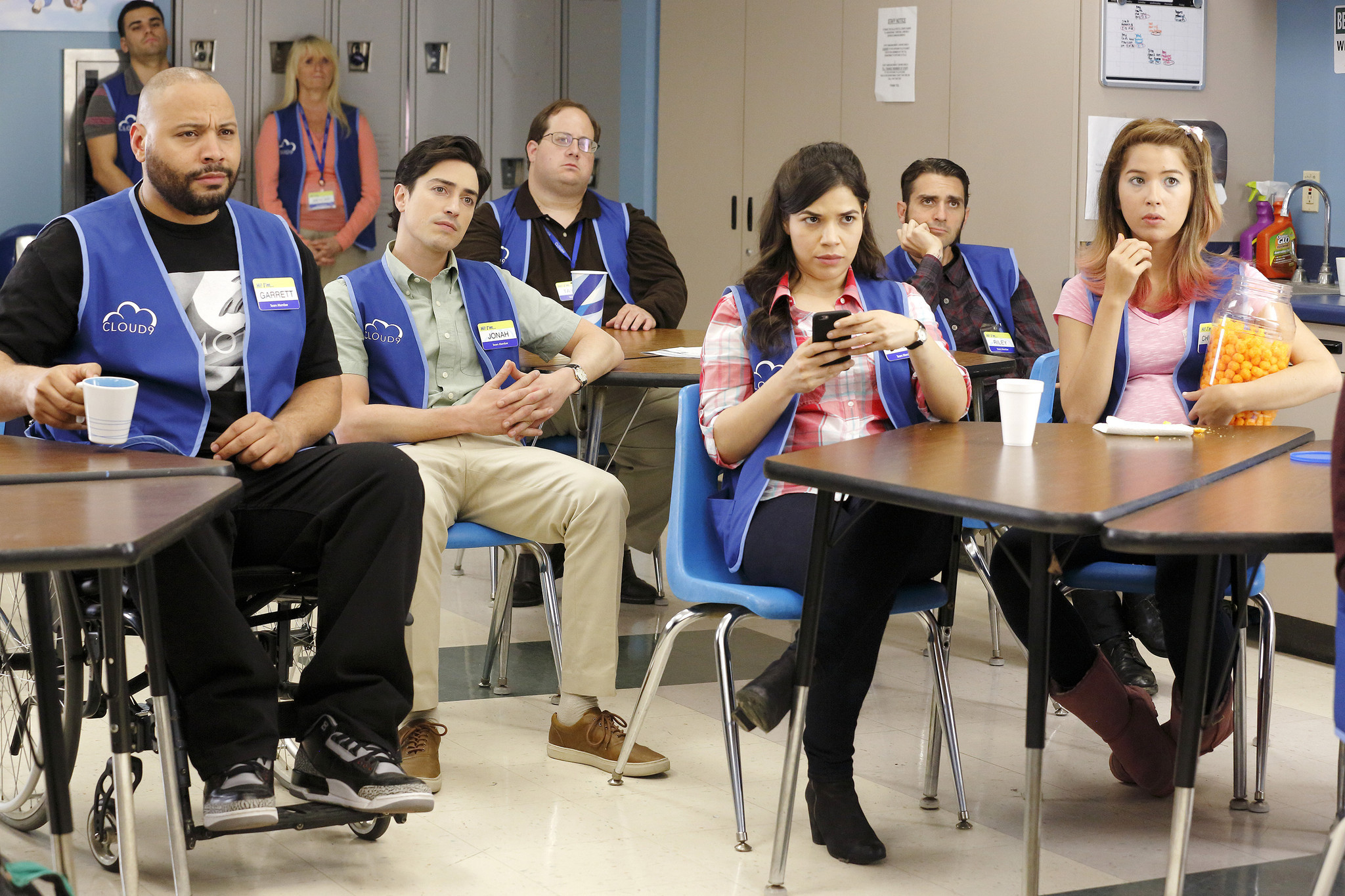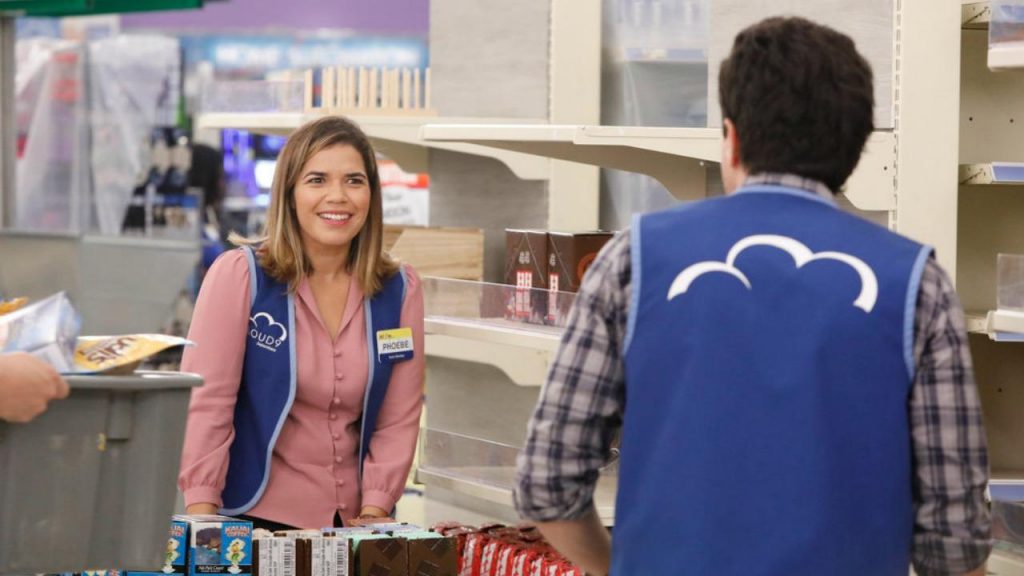Following a sneak screening of a hilarious episode from the upcoming third season of Superstore, NALIP’s Latino Media Fest hosted a conversation with the two Latina writers on the show, Sierra Ornelas and Vanessa Ramos. Although both of them have extensive resumes working in television – Ramos on multiple Comedy Central Roasts and Bordertown and Sierra on shows like Happy Endings – this is the first show where they have had the opportunity to work alongside another woman of color, or any other person of color for that matter.
This points to the fact that more often than not, writers’ rooms at major networks only allocate one slot for a diversity hire, creating a counterproductive sense of competitiveness between talents of color. Rather than building a community, this practice isolates them by making it seem there can only be one person of color on the team at a time. Having someone else with a similar background and perspective can validate ideas and provides a louder voice in terms of the topics and stories being told, as both Ornelas and Ramos can attest.
From getting a chancla gag included in the show to promoting the idea that diversity is a good business model, both writers share lots of tips on how to break in and navigate the white world of writers’ rooms, advice that can be applied to many other creative pursuits. Here are some highlights from the Latino Media Fest session.
Sierra on Her Advice for Being in a Writers’ Room
It was a lot of reading rooms, and trying to figure the way to talk and the way not to talk, taking the temperature of the room that you’re in. Finding a way to be useful, but at the same time, not annoying. At the staff writer level, the margin for error is so big. There’s no reason for a staff writer to be annoying, so much of it is just trying to be a positive force in the room. Be useful. I did all kinds of stuff. I offered to babysit, but don’t do that! Don’t make baked goods and don’t offer to babysit.
Vanessa on Getting Help from a Famous Comedian
An opportunity came up to submit for Jeff Ross, who was doing a Roast-based show called “Burn.” As a kid who grew up watching the Roast, it kind of felt like, “Yeah, this is what I’m supposed to be doing.” I begged a friend of mine, and he was able to get an agent to submit a packet. Jeff Ross has been great to me, and he was very honest. It came down to me and one other girl, and he said, “Look, I’ve known her longer, but I think you’re a great writer. I’ll pass along your stuff for the Roast, “and I was like, “Okay, he’s a very nice man, but he’s very high a lot of the time.” I was like, “Okay Jeff, sure you will.” But he did! He wasn’t that high that time, you guys! So he passed along [to] the Roast of Roseanne.
Sierra on Working with Another Latina Writer for the First Time
We’ve known each other all three seasons, and this was the first experience I had ever had working with another Latina women in the room. I’ve been to brunches with Latina writers because we’re like, “We have to go to brunch, because we’ll never be in the same room together.”

On That Chancla Joke
Vanessa: It wasn’t necessarily a chancla joke, but it was a thing where, Ben Feldman’s character, Jonah, comes in and he’s just met Amy’s mom, and so he’s like, “I’m not fully sure what this means, but she said, you’re not too old to get the chancla?” It was more like him guessing. I pitched that, and then the other writers in the room were like, “What is that?” I’d say, “Oh, it’s like a sandal used to hit kids.” They thought I was making it up, so they had an assistant pull it up, and they were like, “Oh my God it’s real.” Of all the things to make up, why would I make that up? So then [Sierra] backed me up.
Sierra: I had to co-sign the chancla joke. They were like, “This is a thing?” I’d be like, “This is very much a thing, ask any child.” But it was so much fun, and then they started trying to use chancla and we were like, “Don’t try to use chancla.” It was one of those things where you have backup, and it’s a great feeling.
Sierra on the Show’s Focus on Working Class People
I think one of the reasons that Justin wanted to make this show was because diversity is everywhere, but it’s so intrinsically in the workplace. He went to Northwestern, so he’s not a super working-class guy, but he filled the room with a lot of people like that. And I would also say that America Ferrera is just amazing, she’s a Producer on the show. She’s brought in a lot of people who are like consultants, who give lectures. There was a woman who wrote this book The New Working Class. Growing up, there was Rosanne, and so many shows that showed working class people, and I feel like Superstore is one of the few that does that anymore. It’s really trying to pay a lot of respect to that experience.
Vanessa on Being Asked to Play Up Her “Latina-ness” for a Job
We did a story in season one that was based off of this weird job that I had doing promos for a Tequila company in San Antonio. It was in a hotel bar, and they were like, “It’s going to be mostly be white guys, so amp up the Latin-ness.” They wanted me to basically put in a little “Vergara” and it was so ridiculous. I told that story in the room, and we did an episode in season one called Shots and Salsa where America’s character is trying to get people to sample the salsa, and she has to ham it up a bit more, and then people are like, “Oh, what’s happening here?” As soon as she get’s more festive, people are interested.

Sierra Ornelas on Why It’s Difficult to Be a Diversity Hire
There is a hierarchy, and you have to respect that hierarchy. Even if your boss is cool about it and says, “There is no hierarchy,” there is a hierarchy. They trust the people they know the most. They trust the people who look like them, which is why I think being a diverse writer in a room can be difficult. There were times as a staff writer where I would pitch a solution and I’ll get nothing, and some other guy would pitch a solution and it’ll be brilliant. I’d be like, “Fuck that guy,” but as I got older and was in the room longer that’s when my voice became more heard. It’s one of those things where you just have to get that sort of emotional currency going with your higher ups and once you have that you can spend that. That process is so hard to learn, especially when you are terrified.
Sierra Ornelas on How Diversity Programs Create Competitiveness
The one thing that these diversity programs create is that there can only be one. It’s like you climb your way Hunger Games-style and then you get thrown in a room with another one and you are like, “There is only supposed to be me,” because you have been trying to so hard and fighting all these people who look like you. One thing I learned very on from Silvia Olivas, who was in the program with us and who had been on Moesha, is how she was so smart at being supportive, helping other writers, and not being competitive. I think as women especially, but also as writers of color, we are taught to compete. I think the more you can help people the better off we’ll be.
Sierra Ornelas on Diversity Being a Good Business Model
Diversity is a good business model. Fast & Furious s the biggest franchise in the history of franchises, and there is a reason for that. People are going to want stories that come our perspective and from our experiences. Now I don’t go in being like, “Thank you so much having me.” No, it’s like, “You want me here because I will make you money and I will tell better stories.” I think having that confidence and trying to project that as, “This is just good business, this is not altruism.” I think that’s important.







